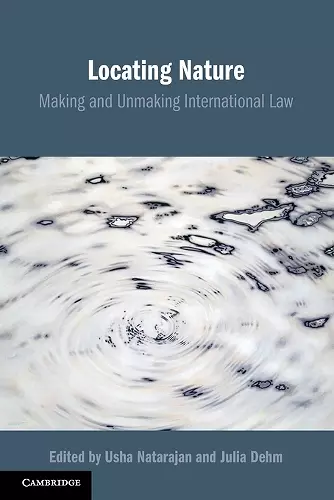Locating Nature
Making and Unmaking International Law
Usha Natarajan editor Julia Dehm editor
Format:Paperback
Publisher:Cambridge University Press
Published:9th Nov '23
Currently unavailable, and unfortunately no date known when it will be back
This paperback is available in another edition too:
- Hardback£95.00(9781108497268)

Examines how international law perpetuates global environmental injustice and how the system can be fundamentally reworked to address ecological crises.
This book explains how international law structures global environmental harm and injustice while claiming to protect the environment. It outlines the possibility for a more sustainable and equitable world by drawing inspiration from diverse disciplines and marginalised sociocultural traditions to move towards a genuinely international law.For those troubled by environmental harm on a global scale and its deeply unequal effects, this book explains how international law structures ecological degradation and environmental injustice while claiming to protect the environment. It identifies how central legal concepts such as sovereignty, jurisdiction, territory, development, environment, labour and human rights make inaccurate and unsustainable assumptions about the natural world and systemically reproduce environmental degradation and injustice. To avert socioecological crises, we must not only unpack but radically rework our understandings of nature and its relationship with law. We propose more sustainable and equitable ways to remake law's relationship with nature by drawing on diverse disciplines and sociocultural traditions that have been marginalized within international law. Influenced by Third World Approaches to International Law (TWAIL), postcolonialism and decoloniality, and inspired by Indigenous knowledges, cosmology, mythology and storytelling, this book lays the groundwork for an epistemological shift in the way humans conceptualize the relationship between law and nature.
'Against the backdrop of the intensifying and life-threatening ecological crisis, this pathbreaking volume seeks to challenge and reconfigure the assumptions that inform international law. Among other things, it underscores the need to reform global capitalism with its focus on commodification and subordination of nature. A must-read volume for all students of international law.' B. S. Chimni, Distinguished Professor of International Law, O. P. Jindal Global University
'This collection of essays on nature brings an imaginative and original dimension to debates about the future of international law. The authors uncover the impoverished concepts of nature that underpin fields such as international environmental law, international trade law, international development, sovereignty and territory. They argue, in many different ways, that ideas about nature are deeply connected with inequality. While sombre in its diagnosis, the book is also hopeful in identifying pathways for change.' Judge Hilary Charlesworth, International Court of Justice; Harrison Moore Professor of Law and Melbourne Laureate Professor, Melbourne Law School; Distinguished Professor, Australian National University
'This is an outstanding book. By 'locating nature' in international law, by placing what we now term 'environmental issues' in the broader context of a history of international law, the authors illuminate in new ways the relationships among the environment and key issues and concepts of international law, including sovereignty, political economy, territory and jurisdiction. This book achieves a coherence and cumulative power rare in edited volumes, and will compel a rethinking of the relationship between nature and international law.' Antony Anghie, Professor of Law, National University of Singapore and University of Utah
'A clear and persuasive explanation of how environmental issues are the responsibility of all international lawyers, this book leads those unfamiliar with these issues to appreciate and engage with the role of the environment in their work. It uncovers harmful assumptions about nature in foundational disciplinary concepts and demands change through democratisation of the discipline, so that sustainable societies in the Global South can play a greater role in international law making. This thought-provoking collaboration is a call for disciplinary solidarity and unity to work together toward sustainable solutions for people and planet.' Obiora Chinedu Okafor, Edward B. Burling Chair in International Law and Institutions at Johns Hopkins School of Advanced International Studies; United Nations Independent Expert on Human Rights and International Solidarity
'This timely edited collection exposes why and how – in the midst of rapidly intensifying environmental pressures – international law (including international environmental law) continues to peer myopically into the 'reality tunnel' that caused them in the first place. Not content to stop at a compelling critique of international law's eco-destructive assumptions, the collection also offers a plausible, powerful international legal counter-narrative fit for the challenges of the age.' Anna Grear, Professor of Law, Cardiff University; Editor in Chief, Journal of Human Rights and the Environment
'This tour de force captures the theoretical and practical challenges for all of international law to understand our relationship with nature better. This book is a thorough collection that will push international lawyers in all fields in new and necessary directions.' Michael Fakhri, Professor of Law, University of Oregon; United Nations Special Rapporteur on the Right to Food
ISBN: 9781108739696
Dimensions: 229mm x 152mm x 21mm
Weight: 588g
406 pages